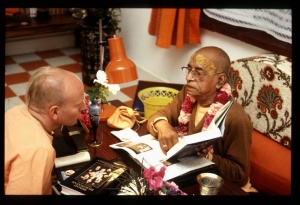SB 10.11.57: Difference between revisions
m (1 revision(s)) |
No edit summary |
||
| Line 1: | Line 1: | ||
{{info | {{info | ||
|speaker=King Nanda and the cowherd men | |speaker=King Nanda and the cowherd men | ||
|listener=King Nanda and the cowherd men comtemplating to themselves | |listener=King Nanda and the cowherd men comtemplating to themselves | ||
}} | }} | ||
[[Category:Srimad-Bhagavatam - Canto 10 Chapter 11]] | |||
[[Category:Bhagavatam Verses Spoken by Nanda Maharaja - Vanisource|101157]] | |||
[[Category:Bhagavatam Verses Spoken by the Cowherd Men - Vanisource|101157]] | |||
<div style="float:left">'''[[Srimad-Bhagavatam]] - [[SB 10|Tenth Canto]] - [[SB 10.11: The Childhood Pastimes of Krsna|Chapter 11: The Childhood Pastimes of Kṛṣṇa]]'''</div> | |||
<div style="float:right">[[File:Go-previous.png|link=SB 10.11.56]] '''[[SB 10.11.56]] - [[SB 10.11.58]]''' [[File:Go-next.png|link=SB 10.11.58]]</div> | |||
{{RandomImage}} | |||
==== TEXT 57 ==== | ==== TEXT 57 ==== | ||
<div | <div class="verse"> | ||
aho brahma-vidāṁ vāco | :aho brahma-vidāṁ vāco | ||
nāsatyāḥ santi karhicit | :nāsatyāḥ santi karhicit | ||
gargo yad āha bhagavān | :gargo yad āha bhagavān | ||
anvabhāvi tathaiva tat | :anvabhāvi tathaiva tat | ||
</div> | </div> | ||
| Line 17: | Line 23: | ||
==== SYNONYMS ==== | ==== SYNONYMS ==== | ||
<div | <div class="synonyms"> | ||
''aho''—how wonderful it is; ''brahma-vidām''—of persons who have full knowledge of Brahman, transcendence; ''vācaḥ''—the words; ''na''—never; ''asatyāḥ''—untruth; ''santi''—become; ''karhicit''—at any time; ''gargaḥ''—Garga Muni; ''yat''—whatever; ''āha''—predicted; ''bhagavān''—Garga Muni, the most powerful; ''anvabhāvi''—is exactly happening; ''tathā eva''—as; ''tat''—that. | |||
</div> | </div> | ||
| Line 24: | Line 30: | ||
==== TRANSLATION ==== | ==== TRANSLATION ==== | ||
<div | <div class="translation"> | ||
The words of persons in full knowledge of Brahman never become untrue. It is very wonderful that whatever | The words of persons in full knowledge of Brahman never become untrue. It is very wonderful that whatever Garga Muni predicted we are now actually experiencing in all detail. | ||
</div> | </div> | ||
| Line 31: | Line 37: | ||
==== PURPORT ==== | ==== PURPORT ==== | ||
<div | <div class="purport"> | ||
The purpose of human life is indicated in the Brahma-sūtra: athāto brahma jijñāsā. To make one's life perfect—in the past, present and future—one must learn about Brahman. Because of intense affection, Nanda Mahārāja could not understand Kṛṣṇa as He is. | The purpose of human life is indicated in the ''Brahma-sūtra: athāto brahma jijñāsā''. To make one's life perfect—in the past, present and future—one must learn about Brahman. Because of intense affection, Nanda Mahārāja could not understand Kṛṣṇa as He is. Garga Muni was able to know everything, past, present and future, by studying the ''Vedas'', but Nanda Mahārāja could not understand Kṛṣṇa directly. Because of his intense love for Kṛṣṇa, he forgot who Kṛṣṇa was and could not understand Kṛṣṇa's potency. Although Kṛṣṇa is Nārāyaṇa Himself, Garga Muni did not disclose this. Thus Nanda Mahārāja appreciated the words of Garga Muni, but because of his deep affection he could not understand who Kṛṣṇa was, although Garga Muni had said that Kṛṣṇa's qualities would be exactly like those of Nārāyaṇa. | ||
</div> | </div> | ||
__NOTOC__ | |||
<div style="float:right; clear:both;">[[File:Go-previous.png|link=SB 10.11.56]] '''[[SB 10.11.56]] - [[SB 10.11.58]]''' [[File:Go-next.png|link=SB 10.11.58]]</div> | |||
__NOTOC__ | |||
__NOEDITSECTION__ | |||
Revision as of 07:52, 20 May 2021

A.C. Bhaktivedanta Swami Prabhupada
TEXT 57
- aho brahma-vidāṁ vāco
- nāsatyāḥ santi karhicit
- gargo yad āha bhagavān
- anvabhāvi tathaiva tat
SYNONYMS
aho—how wonderful it is; brahma-vidām—of persons who have full knowledge of Brahman, transcendence; vācaḥ—the words; na—never; asatyāḥ—untruth; santi—become; karhicit—at any time; gargaḥ—Garga Muni; yat—whatever; āha—predicted; bhagavān—Garga Muni, the most powerful; anvabhāvi—is exactly happening; tathā eva—as; tat—that.
TRANSLATION
The words of persons in full knowledge of Brahman never become untrue. It is very wonderful that whatever Garga Muni predicted we are now actually experiencing in all detail.
PURPORT
The purpose of human life is indicated in the Brahma-sūtra: athāto brahma jijñāsā. To make one's life perfect—in the past, present and future—one must learn about Brahman. Because of intense affection, Nanda Mahārāja could not understand Kṛṣṇa as He is. Garga Muni was able to know everything, past, present and future, by studying the Vedas, but Nanda Mahārāja could not understand Kṛṣṇa directly. Because of his intense love for Kṛṣṇa, he forgot who Kṛṣṇa was and could not understand Kṛṣṇa's potency. Although Kṛṣṇa is Nārāyaṇa Himself, Garga Muni did not disclose this. Thus Nanda Mahārāja appreciated the words of Garga Muni, but because of his deep affection he could not understand who Kṛṣṇa was, although Garga Muni had said that Kṛṣṇa's qualities would be exactly like those of Nārāyaṇa.